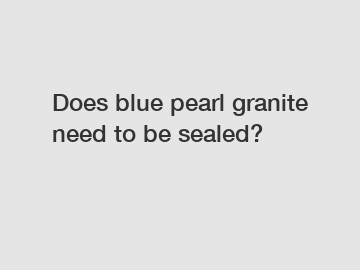Does blue pearl granite need to be sealed?
Does Blue Pearl Granite Need to be Sealed?
Are you considering installing blue pearl granite countertops in your kitchen or bathroom? If so, you might be wondering whether this beautiful stone needs to be sealed. Granite is known for its durability and resistance to staining, but is blue pearl granite an exception to the rule? In this article, we will explore the topic of whether blue pearl granite needs to be sealed and provide you with all the information you need to make an informed decision.
1. Understanding Blue Pearl Granite:

Blue pearl granite is a type of granite known for its stunning blue and silver flecks. It is a popular choice for countertops due to its unique appearance and ability to complement various styles of kitchen or bathroom decor. Blue pearl granite is quarried in Norway and is revered for its rarity and beauty.
2. Natural Porosity of Granite:
Granite is a natural stone that is inherently porous to some extent. However, not all granites are created equal when it comes to porosity. Some types of granite are more porous than others, making them more prone to staining. Blue pearl granite falls on the less porous end of the spectrum, meaning it is less likely to absorb liquids and stains compared to other types of granite.
3. Stain-Resistance Properties:
Due to its low porosity, blue pearl granite has natural stain-resistant properties. This means that it is less likely to absorb spilled substances such as coffee, wine, or oils. However, it's important to note that no stone is completely impervious to staining. Even though blue pearl granite is resistant, it is still advisable to wipe up spills promptly to minimize the risk of staining.
4. The Importance of Sealing:
While blue pearl granite is naturally stain-resistant, sealing can provide an extra layer of protection to keep the stone looking its best. Sealing creates a barrier on the surface of the granite, helping to repel liquids and prevent staining. Sealing is particularly important for areas of high moisture, such as kitchen countertops or bathroom vanity tops.
5. Choosing the Right Sealing Product:
When it comes to sealing blue pearl granite, it is essential to choose the right sealing product. There are various types of sealers available, including penetrating sealers and topical sealers. Penetrating sealers are absorbed into the stone, providing long-lasting protection without altering the appearance of the granite. Topical sealers, on the other hand, create a protective layer on the surface of the stone but may alter the appearance slightly. It's important to read the manufacturer's instructions and choose a sealer specifically designed for granite.
6. How Often Should You Seal?
The frequency of sealing blue pearl granite depends on factors such as usage and exposure to moisture. Generally, it is recommended to seal granite countertops every 1-3 years. However, some experts suggest performing a water test to determine whether resealing is necessary. Simply pour a small amount of water on the surface of the countertop and observe if the water beads up or gets absorbed. If the water is readily absorbed, it may indicate that it's time for resealing.
In conclusion, while blue pearl granite is naturally resistant to staining, sealing it can provide an extra layer of protection and peace of mind. Sealing is particularly important for high-moisture areas like kitchens and bathrooms. By choosing the right sealer and following the recommended sealing interval, you can enhance the longevity and beauty of your blue pearl granite countertops. So, if you're wondering whether blue pearl granite needs to be sealed, the answer is not necessarily, but it is highly recommended.
Contact us to discuss your requirements of european custom granite tombstones, granite headstone wholesale, decorative grey granite pillar wholesale. Our experienced sales team can help you identify the options that best suit your needs.
258
0
0

Comments
All Comments (0)